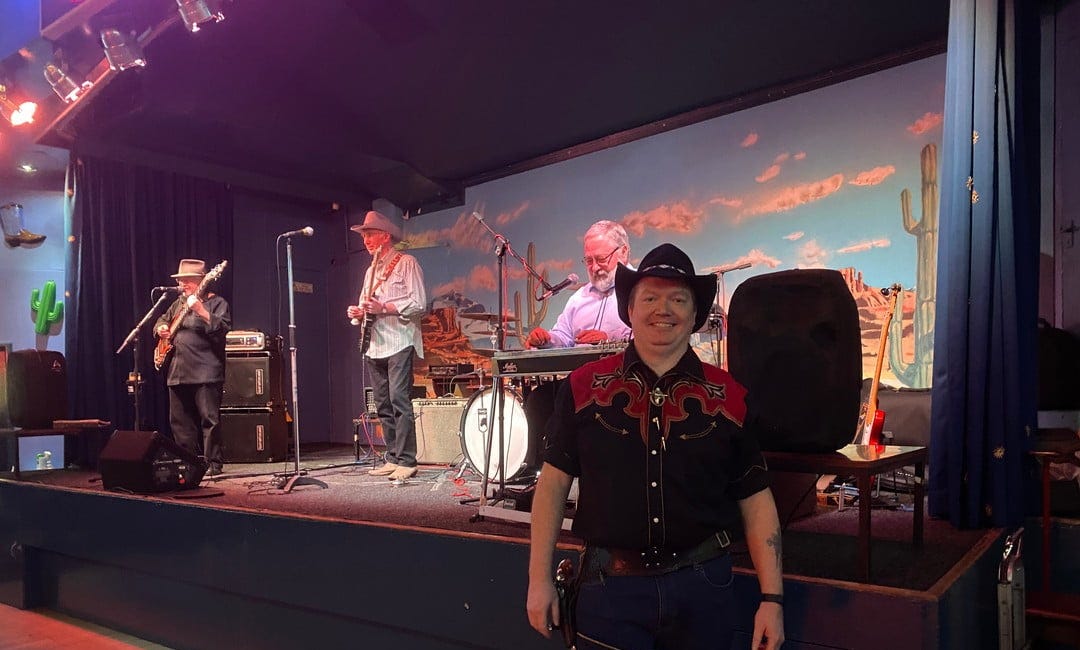This week I visited the Alasdair Gray Archive, a loving recreation of the workspace of that unique artist-writer. Gray is unique because he pursued his ideas wherever they took him. He didn’t aim for social approval. He didn’t suck up to authority figures. He didn’t post memes on social media. He wrote books and created art on his own terms, influenced by the visionaries of the past like Dante, Blake, and Joyce.
It’s difficult to imagine a contemporary equivalent of Alasdair Gray. They wouldn’t be allowed to develop such peculiarities. The likers and lurkers of the attention economy would nudge them into becoming an easily digestible commodity. In other words, they’d experience what has become known as Audience Capture.
The classic post on Audience Capture is by
and features this striking image of mukbanger Nicholas Perry (aka Nikocado Avocado). Bhogal suggests that Perry’s audience pushed him towards eating bigger plates of grosser food to maintain the clicks. The recommendation algorithm on YouTube and TikTok is designed to reward videos that grab attention and, in a world that is drowning in content, this has produced some morbid symptoms. For instance, wrote recently about Pinkydoll, a livestreamer who repeats random phrases like a malfunctioning character in a video game.To be an artist with integrity, it seems they not only have to reject audience expectations but alienate them. Figures like Bob Dylan and Daniel Kitson have all made choices to avoid being pigeonholed. They could play a conventional crowd-pleasing set of greatest hits. The casual fan would be happy. But for the artist, this would be what Sartre calls bad faith.
There is an oft-repeated quote from self-help speaker Jim Rohn: “You’re the average of the five people spend the most time with”. But this is not quite accurate. The influence of others is far more dispersed. Apparently, "if your friend smokes, you are 61 percent more likely to be a smoker yourself. If a friend of your friend smokes, you are still 29 percent more likely to smoke. And for a friend of a friend, the likelihood is 11 percent." Our social connections form a ripple effect.
But to what extent do artists and writers become captives, not of their friends, but of their audience? It is grimly fascinating to see people like Jordan Peterson turn into parodies of themselves, cheered on by their fans.
Peterson’s IDW associate, Eric Weinstein has warned against audience capture. He has talked about posting "poison tweets" designed to annoy his more deranged followers. And Weinstein's former boss, Peter Thiel, thinks that Asperger's can be an advantage in Silicon Valley because “missing the socialization gene” makes entrepreneurs immune to imitation.
While I am a long way from having a big enough audience to change what I write, I am vaguely aware of the kind of things that might alienate people. The circles I move in are either indifferent to golf or dislike it. At least, this was my intuition. And so it proved.
A recent golf-focused Instagram post received half the regular number of likes. We are all tribal beings and golf is an activity not commonly associated with my tribe. They associate it with class privilege, environmental destruction, Donald Trump, and Toryism. It doesn’t matter if you learnt the game on council-run courses (as I did), its meaning has changed.
Perhaps the embrace of Barbenheimer is a sign that we are escaping the narrow-mindedness of the tribal years.
I hope so. We contain multitudes. Including, for some of us, golf.
⁂
So why do I love golf?
For me, golf is not a sport, a game, a hobby or a pastime. For me, golf is a spiritual discipline, a form of meditation. It is where I encounter flow and dharma and the Way. It is where I confront reality.
According to Theravada Buddhists, there are three aspects of reality revealed by meditation. These are impermanence, non-self, and unsatisfactoriness (anicca, anatta, and dukkha). By this reckoning, golf is meditation.
No other sport or game induces more suffering: your intention meets with the grim truth of the bunker, the tree, the rough.
If you do manage to get the ball to go where you want, the pleasure is impermanent, replaced by the reality of the next shot.
And, when you play golf, it is easy for your ego to get in the way, trying to force things, cluttering the mind with thoughts. Golfers need to trust unconscious physical processes. You can't focus on more than one thought as you swing through the ball. We are not in complete control. As John Updike writes: "[great shots] happen in spite of me, and not because of me, and in that sense I am free, on the golf course, as nowhere else."
⁂
If you want to read more on this topic, check out this post from March 2022, where I wrote about trying to find “my thing”.
What's your thing?
The other night I went to the Grand Ole Opry, not the one in Nashville, but the recreation of the Wild West in Glasgow. I love the Grand Ole Opry, not just for the shoot-outs, the Country music, the bingo, the cheap drinks, but because you get the sense that these are people that have found their home, their








I read this one Neil! (at least down to the golf bit 😂)
Was a good one x